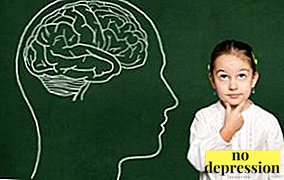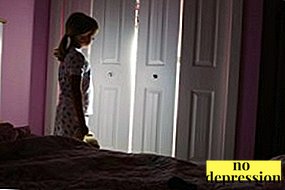Recently, children's neuropsychology has gained great popularity.
She even began to include in the psychological service of some educational institutions.
Let's see in detail what it is and why it is needed at all.
Child neuropsychology - what is it?

Child neuropsychology - this is a science, the field of activity of which is the study of the formation of the brain organization of the child's mental functions, and also explores the development of brain mechanisms (normal or there are disorders).
It also includes diagnosis and remedial treatment, if necessary.
Pathologies studied by science
Let us examine the main pathologies that are entering the field of neuropsychology.
Violations especially common in the sensory and motor sphere. It is known that the formation of the individual, both intellectually and mentally, is directly influenced by brain structures, which are called subcortical.
If a child has a pathology of subcortical formations, it will quickly feel tired in any activity.
In addition, he will difficult to keep attention and concentrate on anything, he will be constantly distracted.
There may also be problems remembering any information. Quite often there is a violation of muscle tone (it is too high or, conversely, greatly reduced).

Child neuropsychology conducts research and remedial activities violations such as:
- problems with understanding, assimilation and subsequent reproduction of information;
- backlog in the development of the school curriculum material;
- obvious difficulties in learning letters, reading and counting;
- increased activity or, conversely, lethargy;
- increased anxiety and nervousness;
- instability in emotions, sudden mood swings;
- tiki and stuttering;
- too low or high muscle tone;
- poor or insufficient motor development;
- poor coordination of movements, the child constantly stumbles and falls.
Neuropsychological syndromes
Neuropsychological syndrome - this is a stable combination of several violations of higher mental functions that occur with local lesions of brain structures.
Consider the main ones.
Dysgenetic
It includes violations in the subcortical and stem formations, based on this and there are:
- Stem Disorders. As a rule, there are various problems in the functioning of the endocrine system of the body, reduced immunity. Children are diagnosed with diathesis, enuresis and encopresis. Quite often there are problems with sleep. Since birth, the baby has a disharmonious development: motility disorders, difficulty learning speech.
- Subcortical disorders. In this case, intellectual development is somewhat better. Children with this pathology speak very well, do not have difficulty with difficult words. But they often have headaches. The child has clumsy movements, often stumbles, hits something, drops objects.
Such babies quickly get tired of the activity of any kind, are distinguished by low efficiency.
They find it difficult to concentrate on one action or subject, attention constantly jumps. They are absent-minded and forgetful. Often these children also have a very illegible handwriting.

Violations of the functionality of the temporal divisions

This syndrome is characterized by damage to hearing memorywhen, when repeating these words, the child replaces some words with others, violates their order.
Also, the baby is experiencing difficulty with soundswhich are similar to each other: he often confuses them, and when writing can often confuse vowels.
Insufficiency of the occipital parts
With such a violation, the child usually can not distinguish between spatial factors, it manifests itself specularity.
There are problems with orientation in space, the baby can hardly show where it’s right, and where it’s left and often confuses the sides.
When writing to him difficult to maintain the line, the words jump, or the line itself is leaning in some direction.
Lack of frontal areas

Characterized by the fact that everything is simplified: writing, reading, speaking.
It is difficult for a child to remember even the simplest rules.
He may not add words or omit prepositions when writing.
Vocabulary is very small, speech is expressionless. The construction of phrases itself is simple, for example, “I play”, “I want to walk”, “I have eaten”, that is, when the kid, expressing his thoughts, uses only one-syllable sentences.
Children's neuropsychologist - who is this and what does he treat?
The children's neuropsychologist carries out activities aimed at the behavior and mental processes of the child, and based on knowledge of the patterns of development and the peculiarities of the functioning of the nervous system in childhood.
is he works with children aged 3 to 12 years (at this age, brain functions are best corrected), in which the following disorders occur:
- problems with the assimilation of the school curriculum and the implementation of educational tasks (inaccurate handwriting, frequent mistakes, lagging behind peers);
- the instability of the emotional state (sharp mood swings, touchiness, vulnerability);
- unwillingness to learn, engage (there is no motivation to learn);
- delay in speech development or any speech disturbances;
- untidiness, lack of independence;
- awkwardness and uncertainty in movements;
- sluggishness and fatigue;
- restlessness, too high motor activity;
- difficulties with concentration, easy distractibility, inability to concentrate on something.

The task of the children's neuropsychologist is to implement a full-fledged diagnosis (using specially designed exercises and tests), identify violations and abnormalities, develop treatment and remedial activities.
At what age is it better to bring the child to a specialist?
A child's neuropsychologist can take a child if he is already 3 years old. But the most productive age for neuropsychological studies is considered period from 5 to 12 years.

This is due to the fact that in this interval the brain is already formed enoughso that the child can learn and develop skills.
At the same time, it still has a high plasticity in order to restructure without special difficulties in a rather short period of time.
How is the diagnosis?
Neuropsychological diagnostics is carried out in a bright spacious room, where there are no unauthorized people or distracting factors and the specialist is left alone with the child.
Wherein the setting should be calm and welcoming: the child should feel comfortable.
The neuropsychologist communicates with the child in short phrases, simple language. This is necessary in order for the baby to better understand what they want from him.
Diagnostics is carried out in the form of a game, in the form of tests and exercises. The duration of its holding is:
- no more than 30 minutes for children of preschool age;
- 40-50 minutes for primary school students;
- 1-1.5 hours for children 10-12 years.

Neuropsychological diagnosis includes research:
- motor functions;
- letters, bills and readings;
- the ability to recognize objects through the senses;
- level of intellectual development;
- memory;
- speech functions;
- interhemispheric asymmetry (right-handedness and left-handedness).
What is the treatment?
In neuropsychology, treatment does not imply medication. Instead, they use neurocorrection. It consists of two components:
- motor (exercises and activities reminiscent of physiotherapy exercises);
- cognitive (tasks for intelligence - exercises resemble work with a pathologist or speech therapist).
Due to the inclusion in the neurocorrection and motor, and cognitive exercises, correctional activities are complex, since the work takes place at once with all spheres.
Assignments are designed to restructure the brain activity of the child so that his motor skills and memory performance improved, there were fewer errors in his studies, attentiveness and diligence developed.

This is achieved due to the fact that those areas of the brain that are actively developing who received insufficient development.
The appearance of functions that were previously absent and do not manifest themselves at all is often observed.
But in order for neurocorrective activity to bring such results, the specialist must have sufficient knowledge to compiling the right program and picking the right tasks.
Thus, child neuropsychology is capable adjust child development, to direct his psycho-emotional and intellectual development to the right course.
What is neuropsychology? Find out about this from the video:



